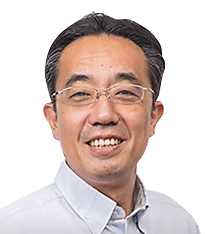- JST Home
- /
- Strategic Basic Research Programs
- /
 CREST
CREST- /
- Research Director/
- Exploring Quantum Frontiers Through Quantum-Classical Interdisciplinary Fusion/
- [Quantum frontiers] Year Started : 2024
[Quantum frontiers] Year Started : 2024
Hiroshi Ueda
Quantum-classical fusion mediated by tensor network
Grant No.:JPMJCR24I1
Research Director
Hiroshi Ueda

Associate Professor
Center for Quantum Information and Quantum Biology
The University of Osaka
Collaborator
| Kouichi Okunishi | Professor Graduate School of Science Osaka Metropolitan University |
| Hidemaro Suwa | Assistant Professor Department of Physics, Graduate School of Science The University of Tokyo |
Outline
This research focuses on developing tensor network methods for the quantum-classical hybrid computing era. It involves creating probabilistic tensor network contraction libraries, integrating tensor-network structural search algorithms, and enabling their large-scale parallel computations. Additionally, we aim to advance quantum utility in condensed matter physics by developing quantum algorithms based on these libraries and employing quantum computers.
Franco Nori
Harnessing quantum simulation and machine learning for early fault-tolerant quantum computation
Grant No.:JPMJCR24I2
Research Director
Franco Nori

Team Director
Center for Quantum Computing
RIKEN
Collaborator
| Yoshitaka Tanimura | Professor Division of Chemistry, Graduate School of Science Kyoto University |
| Masaki Tezuka | Assistant Professor Division of Physics and Astronomy, Graduate School of Science Kyoto University |
Outline
Our goal in this project is to focus on ambitious theoretical research which both takes advantage of small-scale Fault-Tolerant Quantum Computing (FTQC) and prepares the way for efficiently utilized future large-scale FTQC. In pursuance of this goal, we will attempt to answer several open questions in this field, including this question: Can small-scale FTQC be used alongside classical algorithms to simulate the dynamics of complex quantum systems? This project will be particularly focused on developing dynamical simulations which can also operate as dissipative state engineering algorithms, with a focus on applications to complex problems in quantum optics/information/electronics, quantum open systems, quantum chemistry, as well as prospective theories of quantum gravity and other high-energy physics problems.
Yoshimasa Hidaka
Development of New Computational Principles through the Interdisciplinary Integration of High-Energy Physics and Quantum Computing
Grant No.:JPMJCR24I3
Research Director
Yoshimasa Hidaka

Professor
Yukawa Institute for Theoretical Physics
Kyoto University
Collaborator
| Etsuko Itou | Associate Professor Yukawa Institute for Theoretical Physics Kyoto University |
| Keisuke Fujii | Professor Graduate School of Engineering Science The University of Osaka |
| Masazumi Honda | Senior Research Scientist Center for Interdisciplinary Theoretical and Mathematical Sciences RIKEN |
Outline
This research aims to formulate and implement quantum gauge theory and quantum gravity in a form that is efficiently executable on quantum computers, through the interdisciplinary integration of high-energy physics and quantum computing. Additionally, we will develop novel quantum error correction codes by utilizing insights from the symmetries and topological properties of gauge theories and quantum gravity. This approach will enable the simulation of nonequilibrium dynamics and finite-density systems, which have been challenging with traditional methods, thereby opening up new frontiers in the integration of quantum computing and high-energy physics.
Shigeru Yamashita
Exploring the Utilization of Fault-Tolerant Quantum Computers by Using Classical Computers Cooperatively
Grant No.:JPMJCR24I4
Research Director
Shigeru Yamashita

Professor
College of Information Science and Engineering
Ritsumeikan University
Collaborator
| Hiroyuki Tomiyama | Professor College of Science and Engineering Ritsumeikan University |
| Francois Le Gall | Professor Graduate School of Mathematics Nagoya University |
Outline
We will develop a computing platform that decomposes a given problem into multiple subproblems, where each subproblem is handled by either a “fault-tolerant quantum computer,” which is expected to be realized in the future, or by a classical computer, depending on their respective strengths. By solving the subproblems that each type of computer excels at, the platform will solve the entire problem efficiently. Furthermore, by utilizing the developed platform, we aim to create new methods for utilizing a fault-tolerant quantum computer that becomes effective only through the cooperative use of both a fault-tolerant quantum computer and a classical computer.
Taro Yamashita
Scalable quantum computer by fusing superconductivity, magnetism, and machinery
Grant No.:JPMJCR24I5
Research Director
Taro Yamashita

Professor
Graduate School of Engineering
Tohoku University
Collaborator
| Hirotaka Terai | Executive Researcher Advanced ICT Research Institute National Institute of Information and Communications Technology |
| Atsushi Noguchi | Associate Professor Graduate school of Arts and Sciences The University of Tokyo |
Outline
We aim to bring innovation to the scalability of superconducting quantum computers by integrating hybrid quantum/classical technologies of superconductors, magnets, and mechanical oscillators based on nitride superconductors. We develop a new type of superconducting qubits with high performance and scalability, a novel coupler enabling the ultra-fast two-qubit gate, a mechanical quantum memory with a long lifetime, and a broadband quantum amplifier. By combining these technologies, we create fundamental technologies for new scalable quantum computers.
Koji Yoshimura
Frontiers in Space-Time Measurement Pioneered by Nuclear Clocks
Grant No.:JPMJCR24I6
Research Director
Koji Yoshimura

Professor
Research Institute for Interdisciplinary Science
Okayama University
Collaborator
| Yoshitaka Kasamatsu | Professor Graduate School of Science The University of Osaka |
| Yudai Shigekawa | Assistant Professor Institute of Pure and Applied Sciences University of Tsukuba |
| Atsushi Yamaguchi | Senior Research Scientist Centor for Advanced Photonics RIKEN |
Outline
This research aims to develop and apply a nuclear clock using thorium-229, the only nucleus capable of laser excitation. We plan to realize two types of nuclear clocks: the solid-state nuclear clock and the ion-trap nuclear clock, taking advantage of the characteristics of being insensitive to the external field. This will be achieved by uniting and integrating research capabilities from a wide range of fields across Japan. Through this effort, we seek to establish a new quantum measurement technology based on nuclear clocks and pursue innovative applications.













